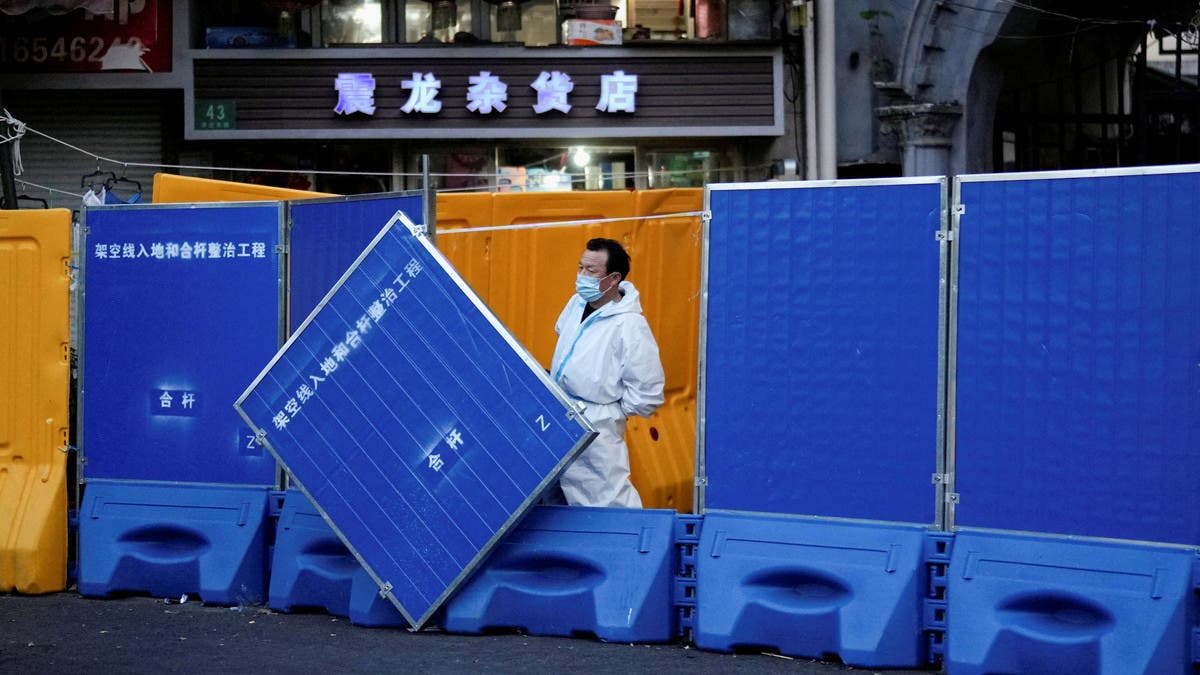The number of people released from Shanghai’s lockdown is smaller than it initially seemed, with the vast majority of the city’s 25 million residents still subject to tight movement restrictions which keep them in their homes or compounds.
On Monday Shanghai announced it was easing the lockdown for the 43 percent of compounds which had no virus infections in the past two weeks. However, details released overnight showed that those 7,565 areas included not just residential complexes but also hotels, shopping malls and government buildings.
For the latest headlines, follow our Google News channel online or via the app.
Residents living in places where lockdowns were technically eased said that they were still barred or discouraged from leaving their compounds by property management or neighborhood committee personnel, and those who did make it out onto the streets said no shops were open and staff asked them to leave quickly.
The ostensible easing comes as Shanghai, home to the country headquarters of many domestic and multinational companies and the world’s largest container port, continues to struggle to stop transmission in the worst COVID-19 outbreak in China in two years. The control measures are now weighing on the world’s second-largest economy and beginning to disrupt global supply chains.
There were 23,342 cases in the city Monday, a drop from Sunday’s record but still up from about 5,000 just two weeks ago.
Although the government did not state the number of people who are now allowed to leave their homes and go for a walk, Monday’s announcement of the easing measures is the first sign of a pathway out of the weeks-long lockdown that spiraled into a crisis as residents struggled to access food and medical care.
Pressure is growing on the city government to address growing unhappiness and frustration on the ground among locked down residents, some of whom have gathered to protest the measures.
Nevertheless, China’s strict Covid Zero strategy remains paramount. Shanghai’s communist party chief Li Qiang on Monday pledged the city will continue with its lockdown rules to control the outbreak, according to a release on its official Wechat account.
The government has also warned that it will reimpose lockdown measures on compounds if they report even a single new case.
Even though residents of housing compounds on the eased list can in theory leave, they are still confined to their neighborhoods and must not enter any areas still under lockdown. While they are out, they can undertake activities like shopping but must adhere to strict social distancing rules.
Restaurants, bars and other entertainment venues such as karaoke outlets remain closed.
Julie Chun, an art historian who lives in Shanghai with her husband in the financial district of Lujiazui, received notification on Tuesday morning that her building was “unsealed” but that residents are still discouraged from leaving due to the virus risk.
Frustrated by more than three weeks of lockdown, Chun and her husband went out for a walk anyway. But personnel dressed in hazmat suits on the streets outside started yelling at them to go back home.
“The walk wasn’t that pleasant,” Chun said. “As soon as we walked out, the reality hit – there is nowhere to go. It is not that exciting to be unsealed when everything is closed.”
Surging virus cases and stringent lockdown measures prompted the US government to order all non-emergency staff at its Shanghai consulate and their families to leave the Chinese city.
The Monday order came days after Washington said all non-emergency employees and their family members from the US consulate in Shanghai were allowed to leave, and told Americans to reconsider travel to China due to what it calls an “arbitrary enforcement of virus restrictions.”
“Our change in posture reflects our assessment that it is best for our employees and their families to be reduced in number and our operations to be scaled down as we deal with the changing circumstances on the ground,” a US embassy spokesperson said in a statement, noting that staffers and their relatives would leave on commercial flights. The departure order will be reviewed in 30-day intervals.
China has defended its approach and expressed displeasure with the US over what it calls “groundless accusations” with regards to its pandemic policies, which it says is essential to saving lives and keeping the economy going.
Read more:
Taiwan issues first war survival handbook amid China threat
Hong Kong security police arrest veteran journalist for alleged sedition
China factory inflation higher than expected as oil prices bite


 World3 years ago
World3 years ago
 World3 years ago
World3 years ago
 Business1 year ago
Business1 year ago
 Entertainment8 years ago
Entertainment8 years ago
 World8 years ago
World8 years ago
 Entertainment8 years ago
Entertainment8 years ago





